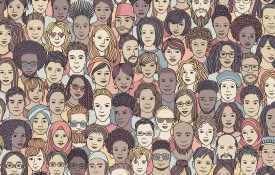-

The Psychological Pros and Cons of Connectivity
A study of employees in South Africa indicates that people generally view their experiences with smart phones, emails, and wireless networks with more positivity than negativity.
-

Heart Trouble: Exploring Links Between Racism and Health Risks
Research suggests that people who live in communities with high levels of overt racism are more likely to die from heart disease and other circulatory diseases.
-
Taking a Dog’s-Eye View of Social Interaction
As many dog owners will likely attest, dogs appear to have pretty sophisticated social skills. Not only can they learn verbal commands, they can also follow a person’s gaze and respond to nonverbal signals, including pointing. But how do they know when a series of events constitutes a social interaction? To find out whether dogs use contingency as a possible cue, researcher Tibor Tauzin and colleagues tested a group of 60 dogs, all family pets that were included in the Family Dog Research Database at the Department of Ethology, Eötvös Loránd University in Hungary. The sample included both purebred and mixed breed dogs, both males and females.
-

More Than Just Faces in a Crowd
Our capacity for remembering items that a
ren’t relevant to the task at hand — such as memory for faces in a crowd — may be greater than previously thought.
-
New Application Deadline Set for Participating in Replication Project
APS recently issued a call for contributors for the latest Registered Replication Report (RRR), which is focused on Dijksterhuis & van Knippenberg’s 1998 “Professor Priming” study on the effect of priming on intelligence, and the response has been overwhelming. The RRR editors have already received nearly 30 applications to contribute; consequently, they have decided to move up the deadline to apply to participate. Applications must be submitted by 11:59 PM EDT on Sunday, August 28th to be considered for this project.
-

What Is Preregistration, Anyway?
The Editors of Psychological Science have been encouraging research psychologists to preregister their research plans before they begin collecting data (or, at least, before they see their data). But what does preregistration actually entail? As

